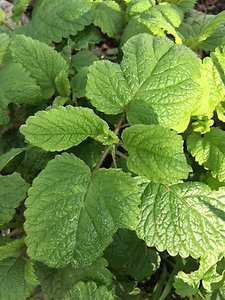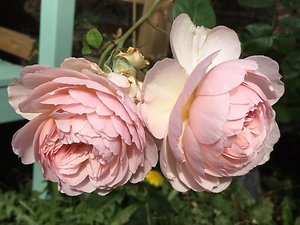Using Herbs
The information on this page is not intended as a substitute for professional medical advice and diagnosis and does not constitute medical advice. Herbs should be used in a safe and nourishing way and not as a replacement for visiting your doctor. If you have symptoms that you are worried about you should consult with your doctor.
Lemon Balm
Lemon Balm is a member of the mint family and is very easy to grow at home from seeds or cuttings. I am a big fan of using herbs that we can grow at home. Growing the herbs yourself can help you feel more connected to them and it is also more environmentally friendly - no air-miles and no plastic packaging.
Lemon Balm has a lovely lemony aroma and taste and is great to drink at this time of year when you have access to the fresh leaves. The dried tea does not have the depth of flavour of the fresh tea. It has been used by herbalists for hundreds of years. Culpeper reported that "it causeth the mind and heart to become merry ..." and Arabian physicians reported its benefit for anxiety and depression. Herbalists still use it today for its nervine sedative actions. It can gently calm the nervous system without causing drowsiness. Trials indicate that it is also helpful in improving memory performance and there is some evidence to indicate that it may improve cognitive function and reduce agitation in patients with mild Alzheimer's disease.
It is not just the nervous system that may benefit from the gentle effects of Lemon Balm. It is also helpful for digestive conditions, particularly if they are exacerbated by stress and tension, such as irritable bowel syndrome, and its antiviral effects (in the form of a cream containing Lemon Balm) have been shown to improve the healing time of cold sores and help relieve the symptoms.
Using Lemon Balm
If you are making a tea, use 2-3 teaspoons of dried herb or 4-6 g of fresh herb per cup of boiling water. Make sure the cup is covered and infuse for 10-15 minutes. If it is sunny, put a handful of fresh leaves in a covered glass teapot and leave to infuse in the sun. Drink cold with ice and slices of lemon or cucumber (and sweetener to taste).
Add a small handful of Lemon Balm to your breakfast smoothie.
Chop up a handful of Lemon Balm and add to blueberries (or other berries) to use in a pie.
If you eat fish, a few leaves of Lemon Balm can add a lovely lemony flavour.
Ginger
As the weather turns cold, we think about warming and hot herbs to heat us up and support us when we catch a cold. One of my favourites is ginger which is a pungent, hot and stimulating spice. Traditionally, ginger is used as a warming remedy to treat cold conditions, and many people reach for a cup of ginger tea when they feel like they are coming down with a cold. Ginger tea is good to take at the beginning of a cold when you are shivering as your body tries to heat itself up to fend off the virus. Later on, when you start to sweat, elderflower and peppermint tea may be more supportive of the body’s natural healing process.
Ginger isn’t just for colds though. Its warming, stimulating and anti-inflammatory nature makes the essential oil a wonderful addition to a massage oil to relieve muscle aches and pains and to massage into cold feet or include in a warm footbath. Clinical studies have also indicated that it may be helpful in reducing the pain associated with arthritis (but if you have arthritis and are on warfarin, please speak to your doctor before using ginger on a regular basis as high doses may have a blood-thinning effect).
Ginger also has a traditional use in aiding digestion as it stimulates digestive secretions and helps with digestion of starches and fatty foods. It also helps with nausea and flatulence and recent scientific research indicates that it may beneficially impact gut bacteria and help promote tissue repair in the gut. For travel sickness you could try placing a few drops of ginger essential oil on a tissue and smelling as needed or sipping ginger tea.
Traditionally, ginger has also been used to treat amenorrhoea (absence of a period) due to cold and also to help relieve period pain. There is some evidence to support the use of ginger for period pain as a small clinical trial in Iran indicated that a dried ginger extract may be as effective as mefenamic acid and ibuprofen (although this would not constitute clinical proof for those of you that like all your treatments clinically proven).
If you are interested in the psychological and spiritual aspects of herbs, ginger helps improve motivation. It gives you courage and confidence to identify what you want and act on it. It is recommended for people who have become discouraged, indifferent or apathetic to infuse warmth and passion into their soul. It is also said to stimulate the mind and promote alertness. It helps balance the solar plexus chakra.
Consider incorporating more ginger into your cooking, but don’t overdo it if you are prone to hyperacidity or have a tendency to be hot all the time and are wandering around in a tee-shirt when the rest of us are bundled up with hats and scarves.
Rose
In her book on Vintage Roses, Jane Eastoe tells us that the origin of roses is shrouded in mystery and that they are estimated to date back some 35-40 million years. They have certainly been used for medicinal purposes throughout the world for thousands of years. Rosa damascena, Rosa canina, Rosa rubra and Rosa Alba all feature in Culpeper’s Complete Herbal. He recommended making a syrup from the flowers of the damask rose and claimed that taking a small quantity at night would keep the bowels regular. He also recommended infusions of dried red rose for heavy periods. In islamic medicine, Rosa canina fruit may be used internally for colds and gastritis and Rosa damascena petals as a tonic to treat bad breath and headaches.
Rose is a deeply nurturing plant that has an overall cooling effect. Today it is used in many different forms for a number of conditions. Rose tincture may be used as part of a formula to regulate and moderate menstruation. It may also be used to help decongest the liver and improve digestion. Rose water will help cool heat and inflammation and may be useful for mouth ulcers or dermatitis. The oil is also used in skin creams to sooth dry or inflamed skin.
There are a number of small clinical studies on rose in which some anti-inflammatory and anti-viral properties have been demonstrated.
A few roses are still blossoming in my garden sharing their beautiful scent at the end of summer. Now we are moving into autumn I am looking forward to curling up with a cup of rose hot chocolate and a good book.
Rose Hot Chocolate
15-20 g of Conscious Love Potion N09 (depending on how strong you like it)
A pinch of cardamon powder
Plant milk of your choice
Melt the chocolate in a small amount of the milk. Add the cardamon and the rest of the milk and heat to near boiling. Pour into your favourite mug and enjoy.
Other ways to bring roses into your life.
Use the buds or petals to make a refreshing tea.
Make rose porridge by substituting 1/4 of the milk for rose water (or less, depending on the strength of your rose water). I like to add a bit of coconut yoghurt to the porridge to make it nice and creamy and top off with some raspberries.


